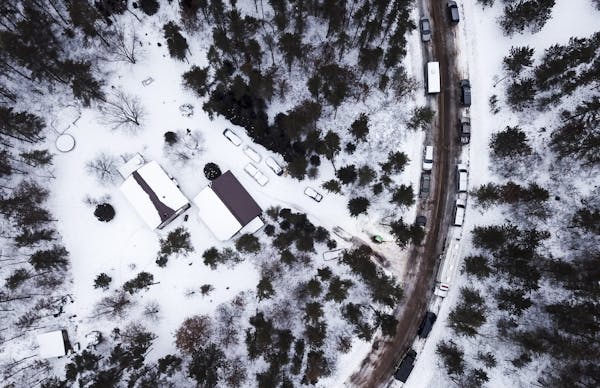Jayme Closs' dramatic homecoming thrilled her Wisconsin community, rewarding its endless prayers with a happy ending.
But for 13-year-old Jayme, her escape from captivity also means a private struggle to come to terms with a life forever changed.
It's likely to be a long, difficult process, but one where healing is possible, according to mental health professionals and other survivors of childhood trauma.
"Today is not the end of her story. It's the middle of this journey," said Alison Feigh, director of the Jacob Wetterling Resource Center. "Now begins the rebuilding and healing process."
The weeks and months to come will bring fresh challenges as Jayme is reunited with her loved ones and grieves the loss of her parents, who were gunned down in their home Oct. 15. Authorities say 21-year-old Jake T. Patterson targeted the family in order to kidnap Jayme.
She must now grapple with how to cope. How to deal with prying questions. How to be a kid again.
"There's a crushing grief and anxiety in realizing that she's not returning to the life she knew," said Daphne Young, chief communications officer at Childhelp, a national nonprofit that aids young abuse victims.
Survivor's guilt may bubble up, and she could struggle with post-traumatic stress, Young said.
Jayme's hometown of Barron, Wis., wants to welcome her back with fanfare, but experts in childhood trauma say that the attention can be overwhelming.
"Some find the spotlight terrifying. They don't want it to define their self-worth," Young said. "She doesn't need to be a hero 24 hours a day. What she needs is peace and support."
A structured daily routine will be key to developing a sense of normalcy, professionals said.
'One day at a time'
When high-profile cases like Jayme's hit the news, they often trigger strong emotions in those who have survived similar ordeals. Extra counselors are staffing phones at Childhelp's National Child Abuse Hotline (1-800-4-A-CHILD) this weekend to field such calls.
Jayme's story brought back painful memories for Sarah Block of Alexandria, Minn., and her daughter, Jasmine, whose abduction bears striking similarities to Jayme's.
In September 2017, Jasmine, then 15, escaped from an abandoned rural house where she had been held captive by three men for nearly a month. After thwarting her captors' attempts to drown her, she swam across Thompson Lake in Grant County, ran through a field and flagged down a farmer for help.
Her homecoming put her family on "cloud nine," but new troubles began, Block said.
Jasmine had never anticipated how many people would recognize her, her mother said. Passersby made a beeline to her in public, calling her a hero. She would thank them, then silently dismiss the praise, believing that instinct, not courage, had led to her liberation.
The following year brought new hurdles, like how to face her kidnappers in court and dodge meddling teens at school.
"She knew everybody was watching her every move, seeing if she was the same Jasmine they knew," her mother said.
She wasn't. PTSD episodes punctuated her recovery process and eventually she was pulled from class to be home-schooled.
After a year out of the public eye, she's now asking to return, her mother said.
Sarah Block's advice to Jayme and her family was simple: "Stay strong and take it one day at a time."
She's not alone
It's not uncommon for a missing child to turn up months or even years later. A recent study by the National Center for Missing and Exploited Children in Washington, D.C., found that 5,000 children were recovered after six months or more.
"All these cases remind us not to give up on those kids until we're absolutely certain," said Robert Lowery, who oversees the agency's Missing Children division. The center refuses to close any missing persons case until the child has been found, dead or alive. (Their oldest active case dates to 1905.)
Research shows that most kidnapping victims are abducted by a person they know. Nearly 40 percent of the time, that person is a close friend or long-term acquaintance. It's far less likely for a child to be snatched by a stranger.
Girls just over 11 years old are some of the most frequent targets, according to data from the U.S. Department of Justice.
As a high-profile survivor of captivity, Jayme joins the likes of Elizabeth Smart, who was taken from her Salt Lake City bedroom and held for nine months, and Jaycee Dugard, whose captors kept her in a California backyard for 18 years. Like her, they made it home safely.
Many are not as lucky.
"What we saw with Jayme strikes a chord with all of us — our worst fears being realized," Lowery said. "But we believe there are other Jayme Closses out there still waiting to be found."
Liz Sawyer • 612-673-4648

Want to share info with the Star Tribune? How to do it securely

'Safe recovery sites' would offer syringes, naloxone and more to people using drugs. The plan could be in peril.
New Minnesota GOP leaders seek peace with party's anti-establishment wing

Who is Republican Lisa Demuth, Minnesota's first House speaker of color?

